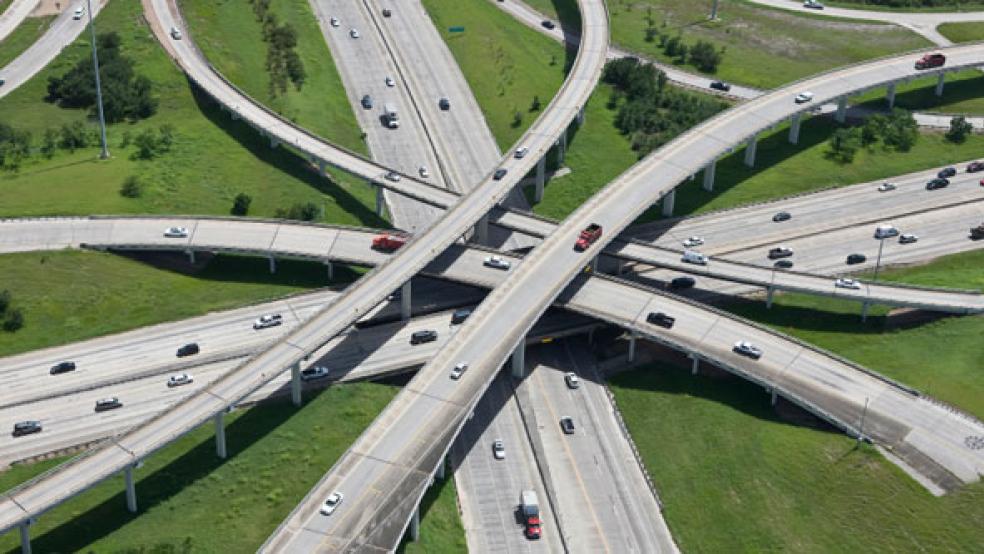Congress has failed so often in the past to approve new long-term highway and transportation legislation that it’s hard to take seriously the latest deadline at the end of the month.
With Republican and Democratic members alike opposed to raising the 18.4-cents per gallon federal gasoline tax and major tax reform out of the question until after the election, Senate and House leaders have been scrounging around for months in search of funds and savings to offset an estimated $275 billion of highway, bridge and mass transit spending over the coming several years.
Related: Congressional Magicians Create an Illusion to Finance the Highway Bill
Congress has never been at a loss to devise a new laundry list of federally funded highway and bridge projects – only how to pay for them. If they fail again later this month and approve yet another temporary extension, it will be the 35th time in six years that lawmakers have kicked the can down the road.
Senate Majority Leader Mitch McConnell (R-KY) and Sen. Barbara A. Boxer (D-CA) conjured up an odd assortment of budget gimmicks and imaginative policy changes that won Senate approval shortly before Congress left on its August recess. But now that the proposed new long-term highway bill is in the hands of House GOP leaders, the prospects are good that the legislation will be derailed again.
The reason has nothing to do with the highway and transportation issues and spending priorities and everything to do with Wall Street.
The American Banking Association and major Wall Street banks are working overtime to persuade the House to scrap a plan that would raise more than $1 billion annually for highways by reducing the annual dividend payments that banks receive for holding shares in the Federal Reserve System. Those payments, made under a little known, decades old program, totaled $1.69 billion last year, including about $310 million for Bank of America Corp. and $250 million for Citigroup Inc., according to The Wall Street Journal.
Related: 5 Gimmicks in the GOP’s ‘Gimmick-Free’ Budget
The Senate-passed plan includes a score of other gimmicks for funding a new long-term highway program, ranging from something as minor as dipping into a “Sportfish Restoration and Boating” trust fund and a “Leaking Underground Storage Tank Trust Fund,” to revamping a number of Internal Revenue Service laws and regulations. There is even a plan to save billions over the long run by requiring the IRS to utilize private debt collection agencies to help improve the collection of money owed the government.
But the most ambitious of the Senate’s plans – designed to generate $16.3 billion over 10 years—is adjusting the rate of dividend payments that Federal Reserve Banks pay to the member banks who own shares in them. The proposal would sharply reduce the current dividend rate from 6 percent to 1.5 percent for large banks with over $1 billion in consolidated assets. It would leave the six percent rate it in place for much smaller banks.
In the arcane world of high finance, banks that belong to the Federal Reserve System are mandated to purchase stock in their regional Federal Reserve Bank in proportion to their capital. In return, the Fed by law must pay an annual dividend of 6 percent to its shareholders as an incentive for being a member. The fact that banks hold stock in the Fed theoretically gives them a claim on their individual Reserve Bank’s profits.
Related: Why Congress Can’t Make a Deal on Highway Spending
According to media reports, major banks are on high alert over the threat of the loss of those payments and are prepared to go to the mat to stop that from happening. Meanwhile, McConnell told bank executives at a private meeting in Washington last week that there was no way he would remove the provision, according to media reports.
The American Banking Association has argued strenuously against the proposal, noting that “there is absolutely no connection between the Federal Reserve System and funding for the highway bill,” and that Senate Banking Chairman Richard Shelby (R-AL) opposed the measure.
“The banks’ investment in the Federal Reserve System is carefully designed and calibrated to provide stability for the Federal Reserve Banks and the U.S. financial system,” the ABA said in its talking points. “The dividend reflects the unique structure and constraints of holding Federal Reserve Bank stock. Ownership of Federal Reserve Bank stock is not an investment choice but rather a legal mandate, with Federal law dictating the precise amount of stock that must be held over time.
Related: Senators Move Towards a Big Infrastructure Deal
At the same time, Fed Chair Janet Yellen has voiced concern about the possible “unintended consequences” of such a policy change, including some state-chartered banks leaving the Federal Reserve system and shifting to a system overseen by the Federal Deposit Insurance Corp. “I would say that this is a change to the law that could conceivably have unintended consequences and I think it deserves serious thought and analysis,” she said.
According to media reports, banking industry lobbyists have held dozens of meetings with key House staffers on the Ways and Means Committee and the Financial Services Committee, in trying to kill the measure. They are also considering the possibility of bringing a lawsuit against Congress if the measure is enacted.
“The industry is in a very dangerous spot because it is a pot of gold” they are fighting over, Karen Shaw Petrou, managing partner of the Washington-based Federal Financial Analytics, told Bloomberg Business. “With the general political climate I don’t know a lot of people on Capitol Hill that like banks.”





